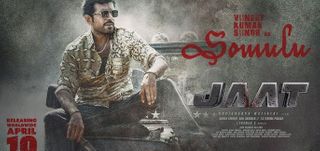
Mumbai Meri Jaan Movie Review
Ah. Finally, it has come- that breeze of fresh air, that booster dose of good, genuine and honest cinema that keeps our cynicism in check, that removes the horrible bitterness that follows months of suffocatingly plastic films that leave you gasping for breath and hope.
Hope comes this Friday in the form of Nishikant Kamat's heart-hitting Mumbai Meri Jaan- hope not only for the future of Indian cinema but also for peace and humanity. A magnificent tribute to the much-abused 'Spirit of Mumbai', Kamat's first Hindi feature (after helming the much acclaimed Dombivli Fast) could be well called India's answer to Crash, but this original and superbly written and performed film deserves better- praise on its own terms, and not through ubiquitous comparisons.
Mumbai Meri Jaan is based on the tragic bomb blasts that hit Mumbai on July 11, 2006, targeting the very veins of the city, the local trains and shaking up the very heart of the city. But rather than being a scalpel that opens those wounds, Mumbai Meri Jaan acts as a healing balm, one that gently rouses and lifts the spirit.
Writers Yogesh Vinayak Joshi and Upendra Sidhaye create a detailed, engrossing script that's thoroughly real, relatable and laced with compelling characters and a wonderful sense of humour- at once both full of comforting warmth and tongue-in-cheek sarcasm. With the backdrop of a terrifying tragedy, the journey of the six main characters of the film vividly delves into the human psychology of fear, hatred, frustration and acceptance. The writing is intelligent, sensitive and serves as a showcase of topical issues without being didactic or preachy, and salutes the city of Mumbai without losing objectivity.
The terrific ensemble cast (one of the best assembled in a Hindi film in a long time) does more than justice to the painstakingly drawn characters, and the performances are all first-rate. Soha Ali Khan couldn't quite take the weight of her demandingly complex character in Khoya Khoya Chand, and she is a lot more in command here playing a journalist who has no qualms about turning stories of human suffering into sensational scoops until a personal tragedy makes the tables turn on her in an almost surreal manner while she looks on helplessly.
Irrfan Khan crafts yet another gripping portrayal as a Tamilian coffee vendor who struggles in frustration to find space for himself in a city that seems to no longer want him. Kay Kay Menon is brilliant as an out-of-work computer salesman who is on the fringes of being a fanatic, underlining his performance with his trademark deadpan comic timing. R. Madhavan is nicely subtle and understated in his role as a man scarred by the blasts and fractured by fear. But the best parts of the film are undoubtedly the ones featuring the Guru-Shishya pair of cops played awesomely by Paresh Rawal and Vijay Maurya. They complement each other beautifully, Maurya's hot-headedness and raw vulnerability serving as a perfect foil for Rawal's character, who with experience has learnt to deal with the unfairness of life with humour.
Maurya is a revelation, but it is Paresh Rawal who stands shoulders above the rest with a humble but towering performance. Each wrinkle on his face reflects the wisdom, pain and understanding accumulated over years of a career with no apparently significant achievement (At his farewell, all that his immediate senior can muster in praise of him is that he cracked wonderful jokes). But while he may not know it, it is he who truly embodies the unbeatable, resilient spirit of the city, and that is his real accomplishment. What joy it is to see one of our country's most skilled and underused actors finally feature in a film that does justice to those vast reservoirs of talent lying wasted all this while. Rawal is good as gold, and in a film full of delicious dialogue he is given to best lines, and he delivers them with the calm assurance of a veteran. Even when the film teeters towards tedium, Rawal is the jaan of Mumbai Meri Jaan keeping the film throbbing and alive.
Technically too, the film is first rate- while the fact that Kamat's direction is outstanding is a given, Sanjay Jadhav's gritty camerawork splendidly captures the ethos of the film and the city, and the background score is resonating, quite like the film itself.
Yes, the film isn't without it's faults- the Soha Ali Khan track is a tad weak and unconvincing in comparison to the others - why she would willingly allow herself to become a victim is something one can't really fathom completely, and the writers' keenness to wrap up everything neatly means that the film is about 15 minutes too late by the time it reaches its wonderful culmination. But quibbles aside- it's still an experience that's not to be missed, and besides, when art mirrors life so closely and beautifully, it's only apt that it too, like life, is forgiven its minor imperfections.
OTHER REVIEWS



















